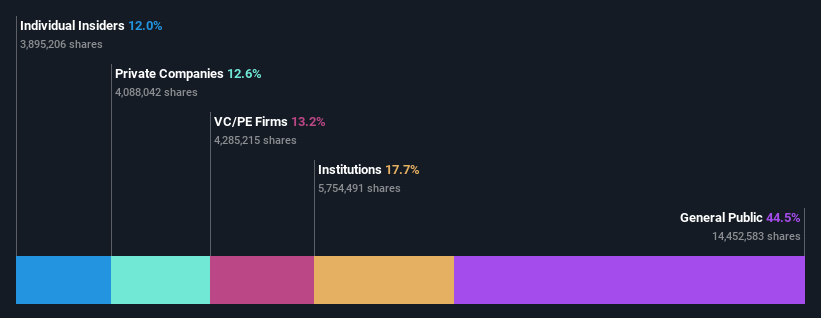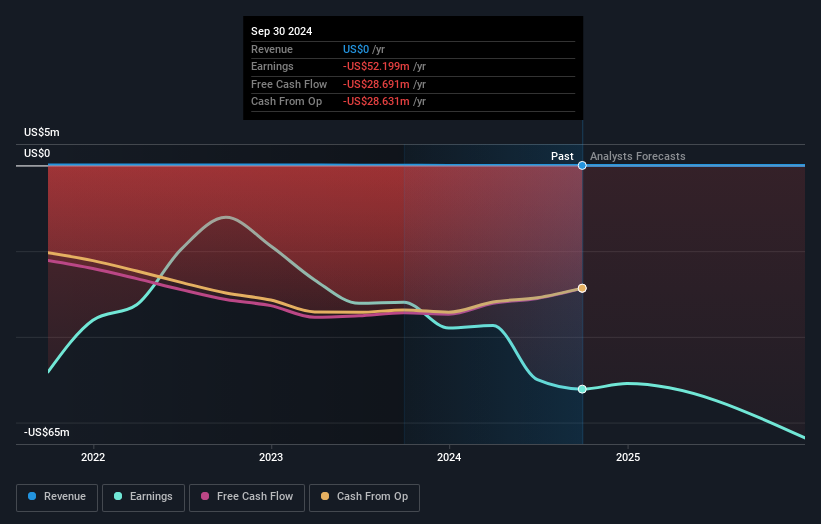- United States
- /
- Biotech
- /
- NasdaqGM:CADL
Institutions profited after Candel Therapeutics, Inc.'s (NASDAQ:CADL) market cap rose US$41m last week but retail investors profited the most

Key Insights
- Significant control over Candel Therapeutics by retail investors implies that the general public has more power to influence management and governance-related decisions
- A total of 15 investors have a majority stake in the company with 50% ownership
- Insiders have been selling lately
Every investor in Candel Therapeutics, Inc. (NASDAQ:CADL) should be aware of the most powerful shareholder groups. With 45% stake, retail investors possess the maximum shares in the company. That is, the group stands to benefit the most if the stock rises (or lose the most if there is a downturn).
Retail investors gained the most after market cap touched US$299m last week, while institutions who own 18% also benefitted.
In the chart below, we zoom in on the different ownership groups of Candel Therapeutics.
See our latest analysis for Candel Therapeutics

What Does The Institutional Ownership Tell Us About Candel Therapeutics?
Many institutions measure their performance against an index that approximates the local market. So they usually pay more attention to companies that are included in major indices.
We can see that Candel Therapeutics does have institutional investors; and they hold a good portion of the company's stock. This can indicate that the company has a certain degree of credibility in the investment community. However, it is best to be wary of relying on the supposed validation that comes with institutional investors. They too, get it wrong sometimes. It is not uncommon to see a big share price drop if two large institutional investors try to sell out of a stock at the same time. So it is worth checking the past earnings trajectory of Candel Therapeutics, (below). Of course, keep in mind that there are other factors to consider, too.

Candel Therapeutics is not owned by hedge funds. Heights Capital Management, Inc. is currently the largest shareholder, with 7.2% of shares outstanding. Meanwhile, the second and third largest shareholders, hold 7.2% and 6.4%, of the shares outstanding, respectively. In addition, we found that Paul-Peter Tak, the CEO has 0.6% of the shares allocated to their name.
After doing some more digging, we found that the top 15 have the combined ownership of 50% in the company, suggesting that no single shareholder has significant control over the company.
While it makes sense to study institutional ownership data for a company, it also makes sense to study analyst sentiments to know which way the wind is blowing. There is a little analyst coverage of the stock, but not much. So there is room for it to gain more coverage.
Insider Ownership Of Candel Therapeutics
While the precise definition of an insider can be subjective, almost everyone considers board members to be insiders. The company management answer to the board and the latter should represent the interests of shareholders. Notably, sometimes top-level managers are on the board themselves.
Insider ownership is positive when it signals leadership are thinking like the true owners of the company. However, high insider ownership can also give immense power to a small group within the company. This can be negative in some circumstances.
Our most recent data indicates that insiders own a reasonable proportion of Candel Therapeutics, Inc.. Insiders own US$36m worth of shares in the US$299m company. This may suggest that the founders still own a lot of shares. You can click here to see if they have been buying or selling.
General Public Ownership
With a 45% ownership, the general public, mostly comprising of individual investors, have some degree of sway over Candel Therapeutics. This size of ownership, while considerable, may not be enough to change company policy if the decision is not in sync with other large shareholders.
Private Equity Ownership
With a stake of 13%, private equity firms could influence the Candel Therapeutics board. Some might like this, because private equity are sometimes activists who hold management accountable. But other times, private equity is selling out, having taking the company public.
Private Company Ownership
We can see that Private Companies own 13%, of the shares on issue. It's hard to draw any conclusions from this fact alone, so its worth looking into who owns those private companies. Sometimes insiders or other related parties have an interest in shares in a public company through a separate private company.
Next Steps:
I find it very interesting to look at who exactly owns a company. But to truly gain insight, we need to consider other information, too. Be aware that Candel Therapeutics is showing 7 warning signs in our investment analysis , and 4 of those make us uncomfortable...
If you are like me, you may want to think about whether this company will grow or shrink. Luckily, you can check this free report showing analyst forecasts for its future.
NB: Figures in this article are calculated using data from the last twelve months, which refer to the 12-month period ending on the last date of the month the financial statement is dated. This may not be consistent with full year annual report figures.
New: AI Stock Screener & Alerts
Our new AI Stock Screener scans the market every day to uncover opportunities.
• Dividend Powerhouses (3%+ Yield)
• Undervalued Small Caps with Insider Buying
• High growth Tech and AI Companies
Or build your own from over 50 metrics.
Have feedback on this article? Concerned about the content? Get in touch with us directly. Alternatively, email editorial-team (at) simplywallst.com.
This article by Simply Wall St is general in nature. We provide commentary based on historical data and analyst forecasts only using an unbiased methodology and our articles are not intended to be financial advice. It does not constitute a recommendation to buy or sell any stock, and does not take account of your objectives, or your financial situation. We aim to bring you long-term focused analysis driven by fundamental data. Note that our analysis may not factor in the latest price-sensitive company announcements or qualitative material. Simply Wall St has no position in any stocks mentioned.
About NasdaqGM:CADL
Candel Therapeutics
A clinical stage biopharmaceutical company, engages in the development immunotherapies for the cancer patients.
Medium-low with imperfect balance sheet.


